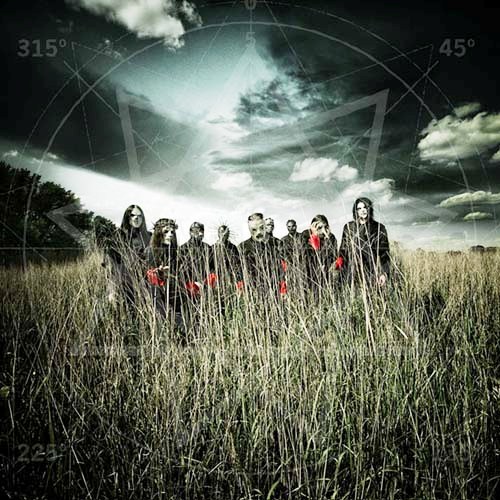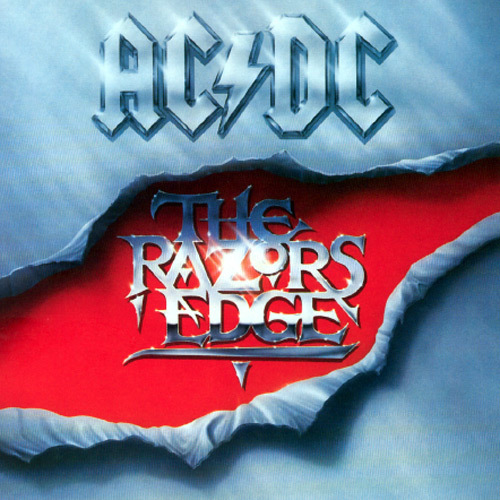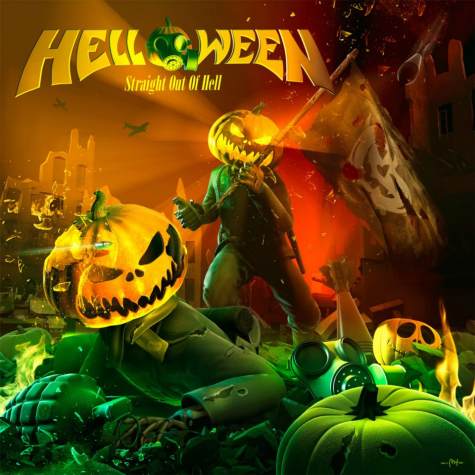 There’s lots of bad music these days. I don’t mind that, but what bothers me is the lack of interesting bad music.
There’s lots of bad music these days. I don’t mind that, but what bothers me is the lack of interesting bad music.
Where’s 2013’s answer to such moments as 2:34 in Korn’s biggest hit? Where’s Faith no More and Mike Patton when you need them? Where are the modern rejoinders to “CRAAAAWWWLIING IN MY SKIIIIN” and “LET THE BODIES HIT THE FLOOOOOR” and other inspired fits of stupidity for when you’ve got too many brain cells? Why does all modern bad music feel equivalent entertainment-wise to staring at a wall?
The first two Slipknot albums were ass and I will hate them forever, but they were memorable. The third was half shitty songs and half songs that I unironically enjoy. This album showcases a new style for the band…or a lack of one. Slipknot has no identity of their own any more. They sound indistinguishable from Chimaira, Lamb of God, and Machine Head. All Hope is Gone is like an album created by a committee.
Opening song “Gematria” writes a big quod erat demonstrandum on this hypothesis. The band doesn’t just use cliches, these use every cliche: It has Machine Head aggro-groove, FFDP-esque tough guy vocals, ultrahardcore breakdowns, and obviously the song itself goes nowhere. You can hear the band asking themselves “well, rapping on metal records isn’t cool anymore so…uh…this is what kids today like, I guess? No? Well about this?”
“Psychosocial” is a more cohesive song with an annoying chorus. “Sulfur” and “Butcher’s Hook” are filler hovering at the outer edge of listenable. “Vendetta” has stupid verses and a stupid chorus and a stupid middle section, there is not a single second of this song that I like.
We get an extra-heavy dose of Slipknot’s softer side this time around. “Dead Memories” is probably the best of the bunch, sounding like Alice in Chains. Then in descending order of quality is “Snuff”, “Child of Burning Time”, “Wherein Lies Continue”, and the worst song on the album, “Gehenna”, which sounds like Kid Rock trying to make a Mr Bungle song or something.
“This Cold Black” is a good song. That is not sarcasm. Somehow things work this time. Every now and then the three neurons this band has between them connect in an interesting way and produce good music. You can’t read too much into it.
The band has barely any use for four of their nine members this time around. There’s not much custom percussion, turntable scratches, or sampling. They sound like just a regular five piece band playing regular five piece music. They traded out the funny lyrics they just to have about Corey Taylor’s shitty childhood and replaced them with lyrics about politics. “ America is a killing name, it doesn’t feel or discriminate…Start a war in another backyard, and we’ll destroy your house of cards“…when I want opinions on the Iraq war, I definitely go to a bunch of people wearing clown masks.
Slipknot used to be a bad band with an amusing side. Now they’re making music so weak and boring that, by the end of All Hope Is Gone, even it seems to be asking you to turn it off.
 After releasing a few albums so featureless that I suffer from narcolepsy thinking about them, AC/DC stopped messing around.
After releasing a few albums so featureless that I suffer from narcolepsy thinking about them, AC/DC stopped messing around.
The greatest four-song streak in accadacca history starts with “Thunderstruck”, featuring a iconic main riff and a great vocal performance out of Brian. “Fire Your Guns” is fast boogieing rock with lots of attitude – when it wants to, this band is better at being Aerosmith than the actual Aerosmith. “Moneytalks” is fun, catchy, and irresistable. “The Razors Edge” is another patented AC/Creepy song…maybe their second best AC/Creepy song, after “Hell’s Bells.”
After these four songs end, the album goes into fillerland, but even the filler sounds energetic, switched-on, and inspired. Listen to “Rock Your Heart Out”, with its nimble, ninja-like slashes of guitar and bass weaving through Chris Slade’s percussion. “If You Dare” is built around a catchy hook-and-release formula. “Are You Ready” is a drawling, sprawling song that sounds like a bar’s last call encapsulated in music. “Shot of Love” has a hard, mid-tempo grind. On every track, the band sounds muscular, vital, and alive.
What happened? Slade is definitely a factor. His drumming is much busier and more interesting than Phil “Wants To Be A Metronome” Rudd. I gather he didn’t work out personality-wise, but he’s probably the best drummer AC/DC has worked with. Normally Angus and Mal’s riffs are what I pay attention to when I listen to this band. On The Razors Edge I listen to the drumming, too.
The production is also a bit different to past records. The muddy, reverb-saturated din of Fly on the Wall et al has been traded out for the crisp production style that AC/DC has used ever since. The title is appropriate, as this record has a sound sharp enough to shave with. This is the first AC/DC album to not be immediately dated by its production style.
But mostly, it’s the songs. They are good, and nothing else is required – the new drummer and revamped sound are just paint. I don’t know what happened, but the band seems revitalised and renewed.
AC/DC realises that never changing your music can be a bug, but it can also be a feature. While other bands are getting in on prog rock or grunge or nu metal, AC/DC just keeps doing what they do, oblivious to trends. On this album though, they made some subtle shifts, and all of them were for the best.
This lineup fell apart, and AC/DC began another gradual slide into boredom. But this was an exciting album, not just on its own merits, but because of what it portends for the future. The old power lives on. AC/DC might seem hooked up to life support these days, but only a fool pronounces them dead.
The missing apostrophe bugs me, though.
 What happened to this band, and what are the chances of it unhappening?
What happened to this band, and what are the chances of it unhappening?
Helloween’s latest album has some good songs. Not too many – you won’t need to graft additional digits on to your hands to count them – but they’re there. Yet it doesn’t matter. The magic is gone. What happened to the good old days, when the songwriting was careless and free? Helloween is now an overcalculated parody of itself.
To recap, Helloween’s Keeper of the Seven Keys 1 and 2 established them as a band of huge promise in the late 80s. Speed metal was already desiccating into something dry and unappealing – Helloween sounded fun, colourful, and catchy. They soon moved away from metal and started aping The Beatles, which went over as well as you’d expect.
The band reshuffled its lineup and had a nice little renaissance in the mid 90s, with Roland Grapow on lead guitar and Uli Kusch on drums. Then that lineup collapsed at its high point (The Dark Ride), and the band decided to call it a day. Or so my crack fantasies go. In reality, here we are with yet another not-so-essential power metal album.
It has better production than the last few albums, but that highlights what a meatless meal this is. Most of the songs are simply not good. And even when they are good, they’re an obvious, safe kind of good. Opening track “Nabataea” is one from the latter category, containing a rote progression of effects-laden intro –> Iron Maiden melodies –> Megadeth thrash riff –> etc. Very predictable. You can almost hear the band ticking things off a list.
That song was written by the guy behind the microphone. If you want to talk about The Beatles, Andi Deris is this band’s Paul McCartney. He’s written some of their most powerful and interesting songs (“Before the War”, “The Shade in the Shadow”, “Time”), but also some of their most commercial and irritating (“As Long as I Fall”, “Mrs God”). On this album, he is an outright liability. He contributes five songs, and three of them are hogwash. Firing Deris would not save this band but it would be huge step in the right direction.
The album’s best moments are penned by Michael Weikath. The scorching mini-epic “Burning Sun” and the catchy and nostalgic “Years” are very good songs, I keep coming back to them even after I’ve forgotten what’s on the rest of this disc. In the Keeper era, Weikath was the band’s weak link. Now he embodies everything that’s still good about this band.
Grosskopf still has his highly active basslines, and Sascha Gerstner makes a fairly good lead guitarist (Roland cannot be substituted for.) I don’t know why I dislike Daniel Löble’s drumming. Maybe it’s the overloud cymbals, maybe it’s his fill-heavy style that tries to make the music all about him. Competent musicianship all around.
But competent musicianship doesn’t mean competent music. Straight out of Hell is boring and crappy. Didn’t they realise that nobody wants to hear “We Will Rock You” by Queen ever again, and that rewriting it into a 2 minute joke song called “Wanna Be God” is gilding a venereal lily? Didn’t they realise that three of these songs (“Far Beyond the Stars”, “Make Fire Catch the Fly”, and “Church Breaks Down”) have the exact same chorus? Didn’t they realise they should have broken up years ago?
 There’s lots of bad music these days. I don’t mind that, but what bothers me is the lack of interesting bad music.
There’s lots of bad music these days. I don’t mind that, but what bothers me is the lack of interesting bad music.

